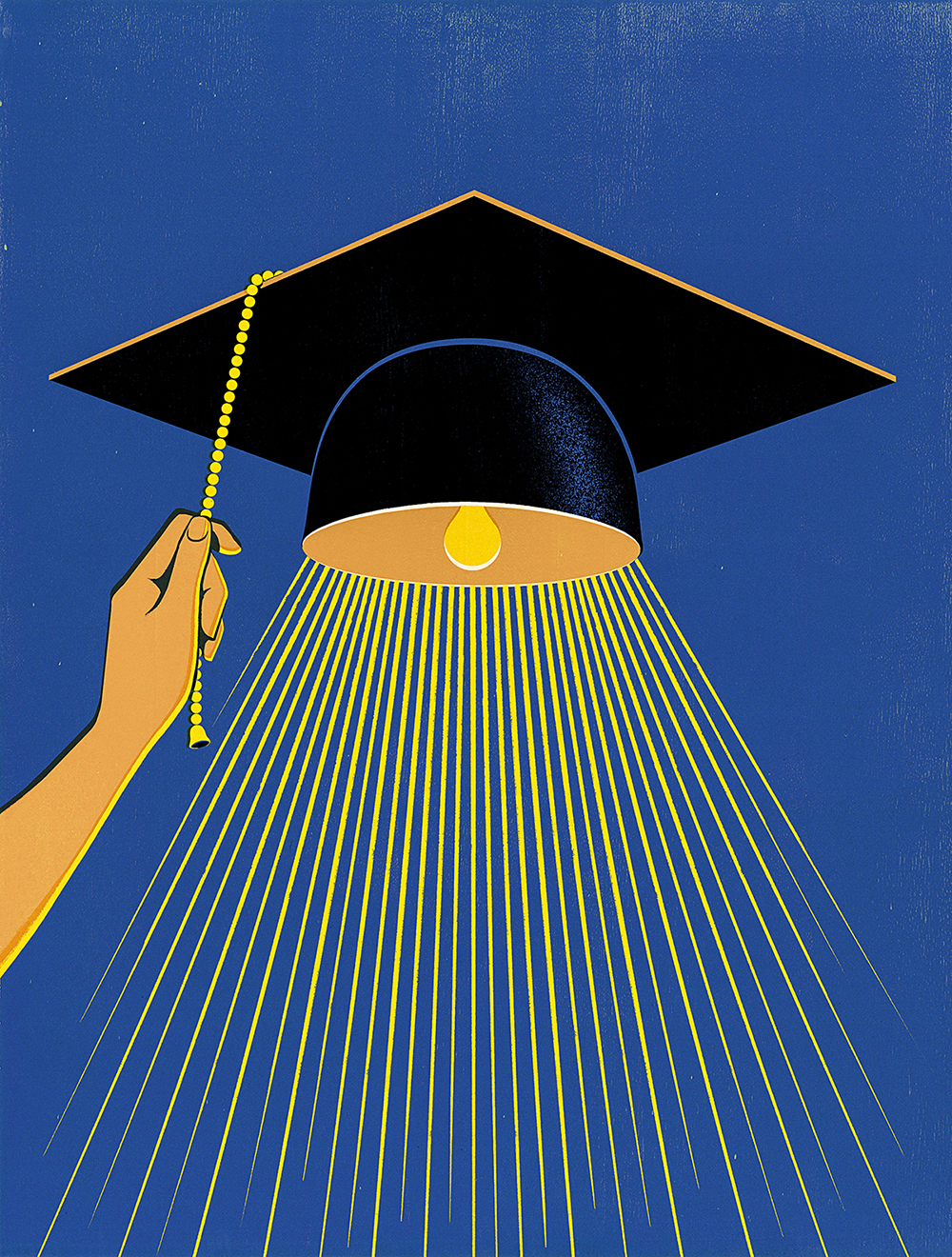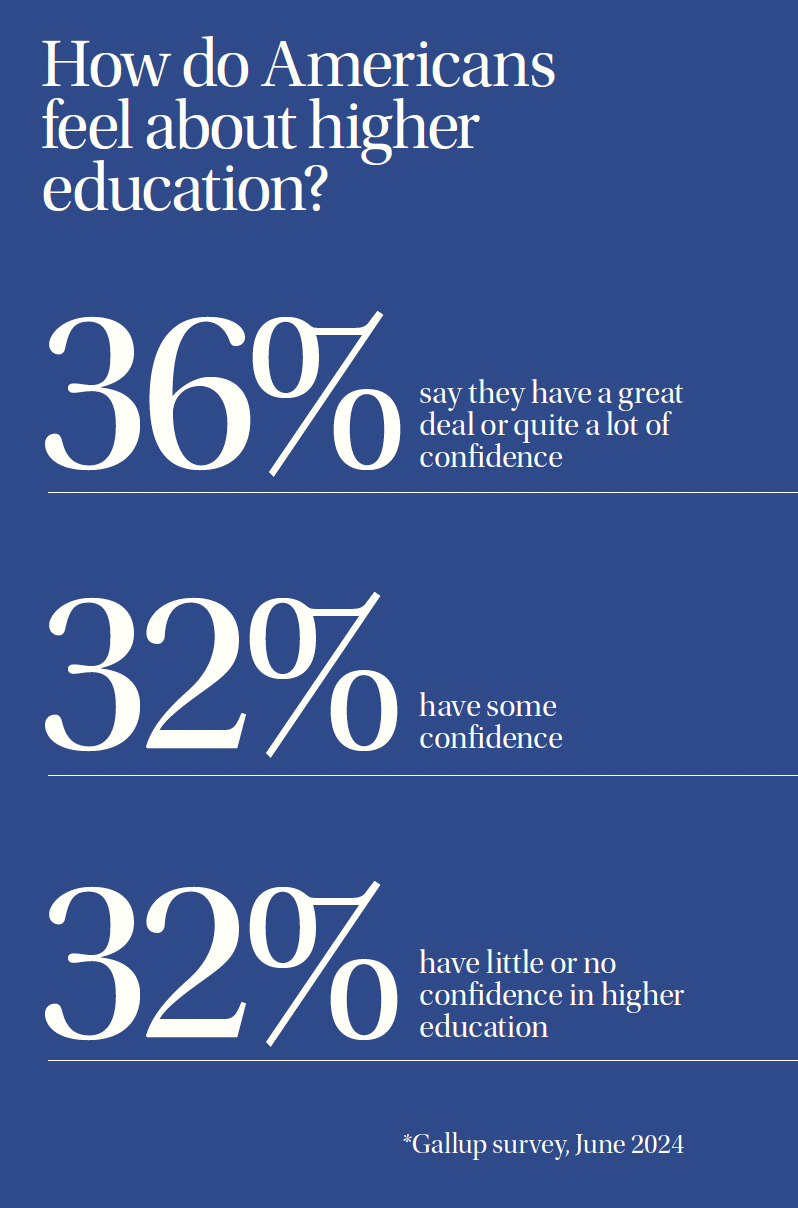Why College Still Matters
By Kenna Caprio
The reality is, deciding where and even if, to attend college is a huge decision. And it’s not without complications.
As the American public has increasingly come to question and even doubt the value of college, lawmakers, critics and public officials have been calling for both more accountability and greater scrutiny. At universities, once revered as bastions for the common good, criticism has often been met with resistance, but FDU President Michael Avaltroni says higher education can use this conversation as an opportunity to make important changes to the benefit of students.

Illustration: Dan Bejar
“I still believe firmly in the value of college, and there is extensive evidence around its value toward higher earnings, a longer lifespan and a host of other benefits. That said, I also acknowledge that an industry that remains unchanged for decades (or centuries); that often talks more about social justice, innovation and equity than practices it in the classroom or on campus; and one with far too much of the student journey left to chance is one in need of change,” says Avaltroni.
“We need to own the fact that institutions of higher education have sometimes failed to deliver on our promise. For every success story, there is someone who carries college debt on an unfinished degree. For every person who used their degree to propel themself to success, there is someone whose degree has left them at a dead end. This is reality.
“The future of higher education can still be a pathway to upward mobility, changed generational narratives and success, but we must do our part to realize this promise more often, with more consistency, for more people. We are a deeply valuable piece of the societal fabric, but we also need to do better.”
Back in 2015, when Gallup first measured Americans’ feelings on higher education, 57% of respondents said they had a great deal or quite a lot of confidence and 10% had little or no confidence. Nearly a decade later, Americans are now nearly equally divided on the subject, with 36% of those polled saying they have a great deal or quite a lot confidence, 32% feeling some confidence and 32% having little or no confidence in higher education.
So why the shift?
Research consistently proves — beyond job security, increased salaries, lower unemployment rates and more career opportunities — that attending college and completing a degree leads to better mental health, reduces risk for premature death and increases civic involvement. People who go to college also report deeper satisfaction, increased happiness and a stronger sense of purpose in their lives.
But.
The cost of college is higher than ever. So even though nearly 80% of people with a college degree say the cost is worth it, initially it can be a deterrent.
Many Americans are concerned that colleges are not teaching students relevant skills, while others cite concerns that universities are pushing political agendas.
How can colleges do better? How can FDU do better?
From its inception, FDU has embraced an education ethos of access and opportunity, with the intent of offering ambitious, experiential education to a broader population of students.
“People think of a university in terms of buildings, of numbers of students, of complexity of curricula. And yet it was in terms of our service to students and the simplicity of our approach that we found the greatest meaning to our lives,” University founder Peter Sammartino once wrote. “This service, we felt, was by far the most important aspect of Fairleigh Dickinson. This was the magic web that held us together and gave us the élan that was the spirit of the institution.”

In that spirit, FDU has prioritized student needs in a multitude of ways over the decades, with the understanding that not every student learns the same way, or attends college at the same age or time.
Avaltroni has spoken often of “meeting students where they are,” which involves acknowledging the needs of a new generation and responding to them more promptly.
At the heart of this approach, Avaltroni and the leadership team are focused on building local, educational, community and corporate partnerships.
“We have been focused on building bridges across institutions and sectors to better align our programs with society’s needs and to better serve students from all walks of life. I believe firmly that higher education must extend its reach and collaborate with others to meet students where they are.”
Avaltroni then continues: “All of these challenges provide us with a once-in-a-generation opportunity to move away from the status quo, questioning every assumption about how universities should operate, who they should serve, and what the ultimate endgame is. It starts with prioritizing students’ interests, success and upward mobility. From there, we’re building new partnerships, creating specialized programs and finding creative ways to deliver more considerable impacts with better economics.”
FDU is currently pushing the needle forward in a number of ways.
Through a renewed commitment to establish community college partnerships — which often allow students to complete their bachelor’s or master’s degrees through FDU while on-site at a community college — students can save on tuition and commuting costs, while creating a class schedule that works for them.
Programs offered through FDU’s Lifelong Learning initiative also reach nontraditional learners, from high school students enrolled in early college programs to adult learners ready to complete a degree, a certificate or workforce development class.
Off-site, FDU has established MBA cohorts at Merck, Novartis, The Park at Berkeley Heights, and Bell Works, for students who work and live outside of the commuting range of the Florham and Metropolitan campuses.
“If we can find ways to create pathways through college that create direct connections between the education a student receives and their employment, we can create opportunities to address affordability. We can also provide students with relevant work experience,” says Avaltroni.
Another initiative that addresses this need is a new cooperative program for students in the 4+1 Master’s in Accounting program. The co-op offers significant financial benefits, including work compensation and tuition reimbursement. Participants will work at an accounting firm, Wiss and Company, LLP, during the summer before starting their master’s degree. In the fall, students will work part-time while completing their classroom-based academic credits. In the spring, they will transition to full-time work with the firm.
A host of new and previously established entities provide additional student support — some devoted to academic needs and others to emotional and overall well-being — including the Hispanic Center, the Centers for Academic Advising and Student Success, the FDU Center For First-Generation Scholars, Student Wellness Services, the Office of Mental and Emotional Wellbeing, the Knights’ Market food pantry and the Devils Care Pantry.
“Higher education is more than classes and grades; it’s about growth, preparation for the future, and building a foundation for success,” says Avaltroni.
“We are preparing our students to lead meaningful, fulfilling and successful lives. Our students do not need us to teach them things that they can learn from Google, but rather to teach them how to think clearly, solve problems creatively, collaborate with partners from diverse backgrounds with diverse perspectives, act ethically and communicate persuasively,” says Benjamin Rifkin, University provost and senior vice president for academic affairs.
The importance of developing these foundational skills and acquiring broad interdisciplinary knowledge cannot be overstated.
“Students will increasingly have multiple jobs over the course of their lifetime, so we need to ensure that the skills they learn here can be transferred from one place to another — from one career to another,” Rifkin says.
“The reality is that if you’re a scientist, you might need to understand health disciplines, business, economics and other fundamentals. You can’t operate in a vacuum,” Avaltroni adds.
FDU’s initiatives are already bearing fruit, garnering outside validation and support — including in the newest U.S. News & World Report rankings, where FDU was rated among the top regional universities in the north in categories that measure value, social mobility and innovation. FDU was ranked in the top 10 in the north for “Best Value Schools” (number 6), and among the “Top Performers in Social Mobility” (13) and “Most Innovative Schools” (13).
These indicators demonstrate FDU’s value and affirm that students succeed in innovative programs that are aligned to their career pursuits and that respond to real-world concerns and societal needs.
“We are determined to make changes that benefit our students, to provide them with flexible and affordable programs that will advance their careers and to inspire them to make lasting contributions to society for generations to come,” says Avaltroni. “I see college as being less of a four-year journey and more of a lifetime commitment. We are building immersive relationships with students that don’t just start the day they get here and stop the day they leave. There’s value in what the students are learning, and they take that into the world, becoming better thinkers, better citizens and better decision-makers.”